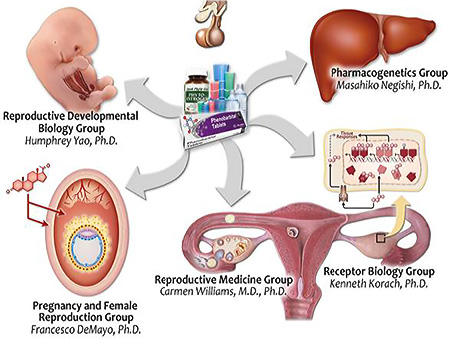-

-
Francesco J. Demayo, Ph.D.
Chief, Reproductive & Developmental Biology Laboratory and Principal Investigator -
Tel 984-287-3987
[email protected] -
P.O. Box 12233Mail Drop B3-02Durham, NC 27709
-

-
Carmen J. Williams, M.D., Ph.D.
Senior Investigator -
Tel 984-287-4313
Fax 301-480-2732
[email protected] -
P.O. Box 12233Mail Drop E4-05Durham, NC 27709
Research Summary
Disease and dysfunction of reproduction and reproductive organs are of great public health concern. Most reproductive disorders have unknown etiologies and environmental factors are likely contributors. To prevent or lessen the burden of environmentally-associated disease or dysfunction, research directed at understanding the mechanisms underlying key processes and identifying key target molecules is a crucial first step.
To this end, the Reproductive and Developmental Biology Laboratory uses basic research to understand important toxicological principles in the context of reproductive and developmental health at a fundamental level. It is also translating information gained from these studies into applied toxicological testing systems and clinical studies and practice.
The Reproductive and Developmental Biology Laboratory is comprised of research groups that study the mechanisms and molecules with key roles in reproduction and development. The purposes of these studies contribute toward:
- Furnishing the basic information necessary to identify targets of environmental agents with detrimental effects on reproduction and development
- Identifying the network of signals regulating developmental processes and events leading to the occurrence of developmental defects
- Providing the advanced knowledge needed to prevent, diagnose and treat diseases and disorders that affect human reproductive health
- Understanding the basic processes involved in regulating reproduction and development
The Laboratory has the following research themes:
- Analyzing the nature and role of molecular components modulating the estrogen receptor-mediated regulation of gene expression, the biochemical and molecular properties of estrogen receptor activation, and the roles and functions of the estrogen receptors in hormonally responsive tissues
- Defining the processes that lead to the formation of different somatic cell lineages and tissue architecture in the fetal gonads
- Determining the cell biology and signaling pathways regulating early mammalian embryogenesis and how the environment influences infertility
- Determining the molecular and cellular mechanisms of nuclear receptor CAR activation, focusing on those xenobiotics that activate the receptor without directly binding and the mechanisms regulating CAR-mediated cell growth and death
- Dissecting the genetic program underlying male germ cell development and function and defining the mechanisms that regulate these processes
- Exploring the stressors present in the environment on human pregnancy, with a particular focus on placenta development, structure-and-function studies of placental specialized processes, and in vitro placenta modeling
- Studying the molecular mechanisms regulating normal reproductive tract and pulmonary function
Scientific Support Staff
-
Margaret M. Scarboro
Administrative Technician -
Tel 984-287-3824
Fax 301-451-5348
[email protected]
-
Eugenia Thompson
Administrative Specialist -
Tel 984-287-3819
Fax 301-451-5348
[email protected]



